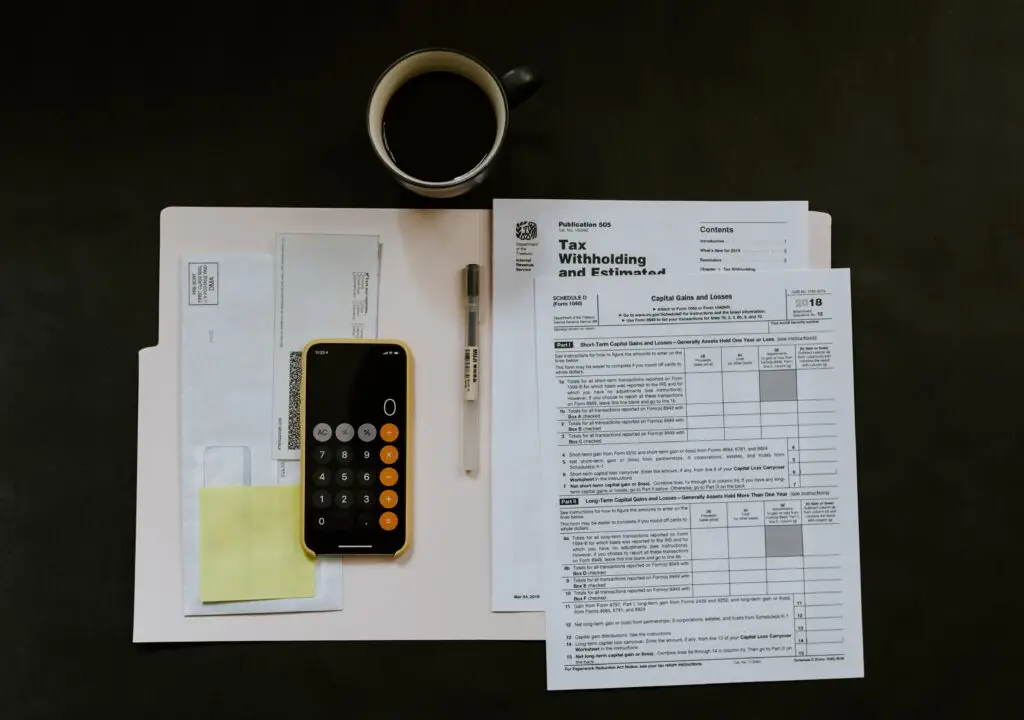2024 has the potential to be a crazy year in America, especially politically. With big questions and big discussions buzzing around at a national and international level, it could be easy to get caught up in the magnitude of it all. And sometimes, the scale of change turmoil and conflict can filter down to our personal, lives, too, leaving us to wonder, “My finances are a mess; what on earth can I do about it?”
Maybe that promotion you were banking on was lost in an unexpected work re-shuffle. Perhaps bottom lines are shrinking all over your industry. Or maybe you’ve even made a financial faux pas here and there — subscribing to more online services than you use, buying unnecessary clothing to “keep up with the Joneses,” or skipping out on one too many home dinners for a quicker but pricier meal out….
Whatever it is, and wherever you’re at, we get it, and at Iron Point Financial, we’re here for you. No matter the state of your affairs today, we want to help.
Read on for five simple but definitive action steps you can take now to get back to thriving, not just surviving.
Assessing the Situation

The first step to solving any problem is understanding the problem itself. As Einstein wisely commented, “No problem can be solved from the same level of consciousness that created it.”
In other words, to clean up your financial mess, you have to do two things: be radically honest with where you’re at (assess your current level of consciousness) and start seeking out new and different perspectives (find ways to get to a different level of consciousness).
So where should we start with those new and different perspectives? Well, we would suggest diving into the nitty-gritty of your income, expenses, debts and savings — the meat and potatoes of each person’s financial reality.
Understanding Your Financial Status
Calculating your net worth — the sum of all your assets (income, savings, real estate, investments, etc.) minus your liabilities (high and low-interest debts, expenses, etc.) — should be your starting point. There are plenty of free tools on the internet to help you with that process, including this one.
Are you in the red or the black? Uncovering this big-picture perspective of your finances can be crucial to understanding how big your financial mess really is, and therefore what you will need to do to tackle it.
Identifying the Root Causes
Why has your financial situation deteriorated? The answer might seem like a mystery in the moment, but asking yourself a few hard questions can help you track this decline over time up to the present day.
Did you:
- Lose your job?
- Get hit with unplanned emergency expenses?
- Have an accident that resulted in painful medical bills?
- Fail to keep track of your purchases over time, so that they’ve snowballed?
- Take on high-interest debt without considering lower-interest alternatives first?
- Make one too many poor investment decisions, such that your overall portfolio has tanked?
- Some combination of the above?
For most people, life is too busy to stop and ask these kinds of questions: things just happen, and then you have to deal with them.
Many believe that there simply isn’t time to consider why things happen, or whether they could have responded differently in the circumstances.
But if you can break out of this unthinking mold and instead diagnose the one or two root causes that have led to your situation, you can implement specific, targeted changes in response — changes that will actually help, and that will stop you from ending up in the same place again.
For instance, if you were hit with an emergency that emptied your savings or plunged you into unexpected debt, you could prevent a similar thing from happening in the future by taking out insurance to cover that situation, or by gradually building up an emergency fund beyond your savings to deal with this kind of eventuality in future (see Tip 5 for more on emergency funds).
Tip 1: Budgeting Basics

Once you have a clear understanding of the root causes of your current financial situation, the next thing you need to do is implement a strict budget.
This budget will help you to track your progress towards freedom from the mess on a weekly and monthly basis. You can find some great, free templates, here.
At a minimum, we recommend taking the information you recorded from your net worth calculation and transplanting it onto a basic spreadsheet with two columns: (1) income and (2) expenditure.
Then we would suggest adding a third column for “insights,” which you can use to link your income and expenditure to the root causes you’ve already established by asking questions like:
- Is there a way this source of income could be increased?
- Could I replace this spending with something that would help me to tackle my root causes?
- Are there any unnecessary items to remove straight away?
If you go through each and every budget item with this mindset, we believe you will start to feel more and more empowered to fix your financial problems, as your decision-making will be based both on your current reality and on the direction you want to go: out of the financial hole and towards financial freedom.
A Warning for the Wise
A word of warning: budgets may be easy to create, but they can be hard to stick to.
If you really want to clean up your finances, you will need to refer to your budget every time you make a financial decision, especially at the beginning:
- Is this a purchase I planned for?
- How is this serving my financial goals?
That kind of thinking can help keep you on track and accountable. Stick at that thought process for the first month, and it will soon start to feel like second nature.
And if you still need some extra help brainstorming which action items to pursue, you could always sign up for credit check software like Credit Karma or Nerd Wallet; these offer free financial tips that will help you to improve your credit score and secure better loan interest rates in future — handy for the kind of situation we’re talking about!
Tip 2: Increasing Income Streams

Even if you’ve done the hard but necessary work of getting your budget set up, you might still be wondering, “Where am I supposed to find extra cash?” If magically creating money out of thin air were a viable option, everyone would be doing it!
So if magic isn’t the answer, what is? Sometimes the best mindset shift to level up your financial consciousness has to do with making more out of what you already have, rather than trying to create something out of nothing.
Negotiating a Raise or Seeking Additional Work
Don’t underestimate the power of a direct conversation with your employer: asserting your value could lead to that long overdue raise, even if it once seemed unlikely. Alternatively, you could seek supplementary part-time work or even look for a new, better-paying job.
Exploring Side Hustles or Freelance Opportunities
Do you have a car? A spare bedroom? A marketable skill that you could put to work in your spare time?
If the answer to any of these questions is yes, then you could be sitting on ready-made income-increasing solutions.
It might not be glamorous, but you could moonlight for a ride-sharing service like Uber, list that spare room on a site like Airbnb, and let the world know about your talents on freelancing platforms like Fiverr.
And remember: you don’t need to see these as long-term commitments. You might only need to lean on these opportunities for as long as it takes to get your finances back in order — and then you could explore other, more sustainable options that take up less energy.
Tip 3: Facing Finances Together

“No man is an island” — and your finances are no exception to this rule. If you’re in a financial bind, work on the solution with others.
This could be especially important if you are married or in a long-term relationship, with joint accounts or regular joint spending items.
Pulling in the Same Direction
It might be tempting to try to tackle things on your own, but in the absence of communication with your partner, you’re likely going to be making more trouble for yourself than you need. Indeed, you could be more focused if you started dealing with your debts together.
Imagine two oxen, attached to the same yoke, trying to plow a field, but pulling off in different directions. I very much doubt that will produce the kind of harvest any farmer is looking for! You’d probably just end up with a zig-zagging, jagged field that isn’t fit for purpose, and some very exhausted and grumpy oxen.
If you don’t sit down to talk through the root causes of your situation and budget together to make a way through, you will probably end up just as confused and tired as the oxen in our metaphor, with both of you shouting the same thing at one another: “My finances are a mess…. and it’s your fault!”
Please, please make your life easier by sharing both the burden and the solution together, rather than apart.
The Kindness of Strangers
Just as it’s important to talk to your significant other about the state of your finances, it can also be important to reach out for help beyond your relationship, to your wider community.
We know that finances can often feel like a very private topic, but what’s the use of staying silent and stuck when there could be help out there?
Some religious communities, for example, have money set aside to help members of their congregations or even strangers. Plus, you never know what other good advice and resources you could receive if you just ask.
You might even connect with someone who’s been in your exact situation, and knows the way out. That kind of person would be able to speak into your life with empathy and wisdom — and by the time you’re back “in the black,” you could well have gained a valuable new friendship.
Institutional Assistance
Some other potential sources of outside help include:
- Government subsidies (e.g. through Social Security);
- Debt consolidation options (rolling all of your debts into a single, low-interest, long-term loan through your bank);
- Payment plans (remember: your creditors want you to pay something rather than nothing, which is why they may offer discounted payment plans); and even
- Debt forgiveness schemes (where your creditors write off part or even all of your debt).
Talking to people in the institutions that help to hold society together might be exactly what you need to go to a “higher level of consciousness:” you might not be in a stable situation, but they are, and it’s in their interest to catch you in their “safety net” — if only you’re willing to jump!
Seeking Professional Help
And if your particular financial mess has more to do with complexity than an outright emergency (an emergency is a situation in which you have literally no resources to spare), you could consider reaching out to a Certified Financial Planner to declutter and demystify your financial affairs.
This might be a good option if you find yourself breaking even each month, but you know you could be doing more with what you’ve got.
Financial advisors can help you take a long-term approach through avenues like Retirement Planning or Investment Consulting, to make your money work harder for you.
Tip 4: Debt Management

Debt can be useful when applied thoughtfully and in moderation — as in the case of most mortgages (where it would be difficult for most people to buy a house without this kind of loan) — or a crushing, cumbersome trap when taken on under duress and without paying enough attention to its repayment requirements.
If you find yourself carrying the latter burden, for example with high-interest consumer credit card debt, we highly recommend aligning all of your financial goals to deal with this one area as quickly as possible.
Strategies for Tackling Debt
The two most common strategies for tackling debt:
- The avalanche method, where you focus on paying off high-interest debts first; and
- The snowball method, where you instead pick off smaller debts one by one, to generate psychological momentum and to make the process more rewarding, much faster.
Prioritizing High-Interest Debt
As a general rule, we recommend the avalanche method, especially if you have high-interest debt.
Taking on high-interest debt should only ever be considered in emergencies, so it stands to reason that dealing with it should have that same “emergency level” priority.
Practically speaking, you could use the budget you created in the first step to funnel resources toward this financial goal. Whether that’s finding ways to cut unnecessary expenses (“unnecessary” means everything except what you absolutely need) or redirecting those extra income streams we mentioned earlier toward this debt, it will be worth it in the long-run.
Whatever the source of this kind of debt, remember that you must be intentional and focused in dealing with it: it will not go away on its own, but will likely build and grow to be increasingly unmanageable if ignored.
The good news is that even if you have not dealt with your high-interest debt early, there are still a few options beyond the two strategies outlined above that can help:
- Payment plans;
- Debt forgiveness; and
- Debt consolidation.
We mentioned all of these tools in the previous section, but high-interest debt can be so burdensome that we think they are worth repeating here. You really cannot let high-interest debt get out of control, so if you can take advantage of options like these, please do!
Tip 5: Building an Emergency Fund

Unless you have the kind of high-interest debt we discussed in the previous section, this fifth and final tip should be the next most important thing to consider when you are working through your budget and assigning your savings and expenditure.
The Importance of Emergency Savings
So what is an emergency fund? Simply put, it’s an amount you set aside for use only in emergency situations.
Emergencies include things like unexpected medical costs or sudden car repairs, not last-minute holidays and other spur-of-the-moment luxuries.
The purpose of an emergency fund is to stave off temptation to take on unnecessary debt when disaster strikes, and the emotional stakes — and pressure — are already high.
It’s better to willingly, carefully save today for that “rainy day” than be forced to compound your issues later in a scary, unknown situation.
Practical Emergency Fund Starters
So how do you go about establishing your emergency fund? Start small, and set a clear, achievable goal — for example, $1,000 set aside in your fund by the end of the year.
We recommend creating a new account or sub-account with your bank specifically for your emergency fund — one that you can easily transfer some money to every time you receive your paycheck. Many modern banks have this kind of functionality built into their service.
Tips for Growing Your Emergency Fund
For some people, $1,000 might sound like a lot, but if you consider that just one meal out for two people could set you back around $85 per restaurant visit, choosing to put just this amount in your fund each month would get you all the way there by the end of your first year.
And once you’ve reached that $1,000 goal, we recommend setting your sights even higher: a three-month emergency fund that has enough to cover your necessary budgeted expenses (rent/mortgage, basic utilities, etc.).
That way, you will have a financial buffer to rely on if, for example, you or your partner were to lose your job out of the blue. In that scenario, your three-month fund would give you a bit of breathing space while you look for another job.
Summary Thoughts
Even if you started off reading this article worrying, “My finances are a mess!” that doesn’t mean you can’t turn your upset into an opportunity — a call to action towards greater financial literacy and personal resilience.
Each step outlined in this post, from rigorous budgeting to strategic debt management, can be a rung on your ladder out of the financial hole.
So start today, stick at it through thick and thin, and watch as you are slowly but surely able to bring your finances back under control. You’ve got this!
Further Resources
- The 11 Key Components of Financial Planning
- Financial Stewardship: What It Is and Why It Matters
- Unretirement & The American Dream: An Unexpected Phenomenon
- What No One Tells You About Financial Discipline: Level Up Your Finances






